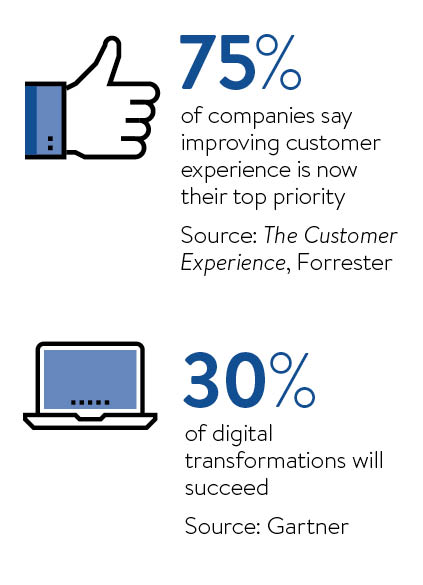Being agile is vital for professional services firms of all sizes, but most notably large enterprises across sectors such as advertising, consulting, audit and advisory, IT, and engineering. Quite simply, if they fail to meet the expectations of their clients, there are plenty of predatory competitors all vying for the work.

Neil Davidson Vice president enterprise Deltek
Deltek works with the world’s leading professional services firms, including the five largest audit and advisory firms, ten of the world’s biggest engineering companies and the three largest holding companies in the advertising industry, and sees first-hand the impact increasing client expectation and the pressure to improve customer experience is having on their sector.
Enterprise agility enables these organisations to respond rapidly to emerging trends and changing market conditions, while optimising the time to value for their stakeholders, whether partners, private equity-owned or publicly listed. It also has huge implications for firm’s global activities, for example their ability to deliver capability in a new geographical location, which could entail deploying hundreds of skilled people in a new overseas office at very short notice, while also ensuring the internal infrastructure is in place to manage their project and knowledge-based work.
All this has to be seamless because client expectation demands it. Supporting this operationally requires a rock-solid technology foundation that provides full transparency, speed and a robust business infrastructure.
Enterprise agility enables organisations to respond rapidly to emerging trends and changing market conditions, while optimising the time to value for stakeholders
Forrester’s The Customer Experience report found that improving customer experience is now the top priority for 75 per cent of companies. Clients are in the driving seat, demanding increasingly complex commercial models based on things such as project outcomes and shared risk. A typical enterprise-size global professional services firm can have between ten and fifteen variations of revenue recognition to manage, all to be delivered by a flawless invoicing system. Enterprise agility is absolutely key to meeting the demands of your clients in terms of how they want to work with you.
 Second only to customer experience as a business priority is hiring and retaining top talent, as a recent IDC survey revealed. This impacts directly on the ability of professional services firms to deliver on their operational commitments. The reason we see talent leaving professional services firms is because the talent proposition and the business operations are not joined up. People want visibility of the work they’ll be doing from week to week and the value they will add to the organisation, while establishing and progressing their own careers.
Second only to customer experience as a business priority is hiring and retaining top talent, as a recent IDC survey revealed. This impacts directly on the ability of professional services firms to deliver on their operational commitments. The reason we see talent leaving professional services firms is because the talent proposition and the business operations are not joined up. People want visibility of the work they’ll be doing from week to week and the value they will add to the organisation, while establishing and progressing their own careers.
By aligning talent management plans with business operations, professional services companies give their talent no compunction to leave. Furthermore, aligning talent values with overarching business priorities is imperative because outperforming rivals requires urgency and diligence throughout the organisation.
A robust technology foundation enables global professional services organisations to manage the constantly changing regulatory environment, where change can range from moderately complex, for example changes to company accounting practices, to immense, as in the case of the UK’s impending European Union exit, or the 2014 changes to revenue recognition practices for customer contracts.
Transitioning a global firm with potentially thousands of people and operations in dozens of markets is a huge challenge, particularly in light of the sobering Gartner forecast that only 30 per cent of digital transformations will succeed. However, those that are delivering on their digital transformation goals have the key foundations in place and have rightly focused on people, process and technology, in harmony, to drive the desired outcome.
Cloud technology creates tremendous opportunity for a business to transition its technology to an enterprise service backed by contractual guarantees on performance and security. But in order to leverage these opportunities, the business and the people in it need to change and adopt industry-leading practices.
To achieve fastest time to value, they also need technology partners with an inherent understanding and a business technology capability aligned with the innovators in their sector.
Mott MacDonald is a global engineering, management and development consultancy with more than 16,000 people delivering projects in 150 countries. It sees enterprise agility and rapid response to business change as key to maintaining its high standards, and is partnering with Deltek to transform their internal business infrastructure with a cloud enterprise resource planning (ERP) system. This is driven by a business delivering consistency across all their projects, clients and global imperative to entities, now and in the future.
Digital transformation director Darren Russell says: “Mott MacDonald’s leadership team has made ‘digital’ a top strategic priority for everyone in the organisation as it is a critical factor in the success of any business transformation. To be at the forefront of our industry and digital-thinking, we must focus on understanding our clients and their customers to ensure we deliver outcomes that add value. This requires aligning the right combination of expertise across sectors and geographies.
“To enable this we’re investing in the latest technology to maximise collaboration and connected thinking. Clients will benefit from our own internal data excellence, seen in the way we innovate to support their needs during delivery.
“We have a mobile workforce and our people are always on the move. To share and support our customers’ ambitions, we need a business system that is equally mobile and maximises the value of our people. Using the system to identify and allocate the right people to the right projects at the right time, we can help our clients to establish the steps needed to deliver their business strategy successfully.”
Speed of implementation, enhancing joint-venture projects, transitioning processes, such as quality assurance and billing to be more automated admin and increase cross-functional collaboration, are seen as valuable additional benefits of Mott MacDonald’s digital transformation.
“Getting the business system right is essential,” adds Mr Russell. “You need agility in your business processes to deliver projects consistently that meet client expectations in a world of change – and for us that is key.”
Deltek clients provide regular feedback on how enterprise agility has positively impacted their business operations. Marianne Blixt, chief finance officer at Grant Thornton, Sweden, says: “We can see where we make money. When expanding our service portfolio, it is important that we can analyse engagement and client profitability.”
Carl Vad Jensen, chief finance officer at Atkins, says the design, engineering and project management consultancy has optimised the allocation of core competences, ensuring they are used on the right projects, which has a positive effect on the bottom line.
A decade from now, the market-leading agile professional services firms will be those that invested in a solid foundation, a single integrated global backbone to meet the geographical and project demands of an evolving client base, and to deliver on client experience.
With the right business technology platform they are equipped with an aptness to hedge against uncertainty, make well-defined strategic moves with lightning-speed capability to respond to a rapidly evolving market and customer base.
For more information please visit www.deltek.com


